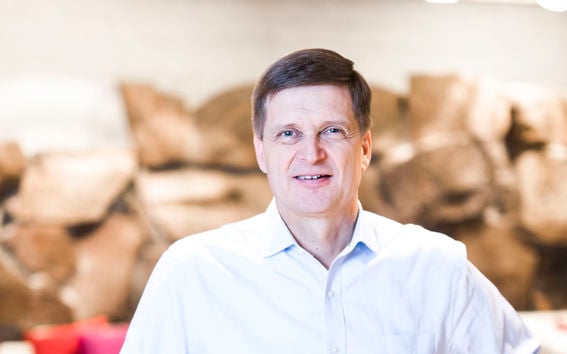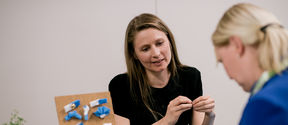Our strategy
Aalto University's future is built upon a foundation of high-quality research, education, impact and shared values – responsibility, courage, and collaboration. The purpose of the university is to shape a sustainable future.

Laura Juvonen, Executive Director for Growth and Skills at Technology Industries of Finland, asked Aalto University President Ilkka Niemelä five topical questions about innovations and corporate collaboration at a webinar for business leaders on May 21.
When Aalto University was founded, the aim was to establish an innovation university. Is Aalto an innovation university?
In ten years, Aalto has become a pioneer and is one of the leading universities in its key areas. Producing innovations requires both multidisciplinary research as well as extensive networking. We want to make an impact in society by solving major global challenges together with our partners.
Aalto has a wide network of partners, and we engage in collaboration with more than 2500 companies. Aalto is ranked internationally among the 25 best universities in multidisciplinary collaboration. About 70 percent of master's theses are done in collaboration with companies. Aalto ranks fourth in Finland in patent applications and nearly 100 companies are set up each year in our ecosystem.
So, it is fair to say that Aalto is also an innovation university.
The Finnish Government aims to increase investments in research, development and innovation from the current 2.7 percent to 4 percent of GDP by 2030. How important and how realistic do you think this goal is?
It is a tough but very important goal. Studies show that in countries of high added value like Finland, 2/3 of competitiveness and productivity is based on technology, innovations, and research, while 30 percent is based on education. By investing heavily in these we can ensure Finland's growth and competitiveness in the long term. This is a question of fate for us.
According to the OECD, the Finnish labour market has a great need for a high level of skills and knowledge, and especially in technology there is a shortage of experts. What is your take on this challenge and how does Aalto meet its responsibility in this regard?
Responding to the demand for skills and knowledge is a huge challenge for the Finnish education system. The regional imbalance in the education that is available also creates challenges. The greatest shortage of labour is in the Helsinki region, which has the lowest proportion of educational vacancies compared to the number of upper secondary school graduates.
Aalto is committed to taking greater responsibility for degree training in the fields of technology and business education as well as arts and design. We plan to increase the number of new students by 20 percent by 2022. This is a considerable investment for us, for which we also need long-term support of the private sector, especially considering the current great uncertainties in the prospects for the public economy.
We also invest more than ever in developing the skills and knowledge of those who are employed. We recently opened a website with all of Aalto's offering for lifewide learning.
Why is corporate collaboration important for Aalto?
Collaboration is an opportunity for us to learn and to get researched information and skilled experts to benefit society more quickly, to build competitiveness, and to achieve changes that are needed to solve problems of sustainable development. Collaboration opens new perspectives to education and helps us understand what the key challenges for research in the future are.
We aim to create long-term strategic partnerships which include collaboration in research and teaching, as well as employer services. We want to make it possible for students to get good jobs, and to offer the best expertise for businesses. The more companies are involved in Aalto's research and innovation ecosystem, the easier it will be for us to find beneficial solutions for everyone.
Finnish government’s third matching funding campaign for universities is under way. What is the importance of donations for Aalto?
We would not be where we are today without donations and previous matching funding campaigns. They have made it possible to develop the university in the long term and to balance out fluctuations in public funding that sometimes come unexpectedly. Donations have also enabled the economically sustainable development of the campus as a meeting place for companies, researchers, and students.
I hope that companies could be even more active as donors especially considering the uncertainties in prospects for public funding, and the shortages of skills and experts in Aalto's key areas of education. By donating to Aalto, it is possible to directly make a difference in the development of your own area of business.

Aalto University's future is built upon a foundation of high-quality research, education, impact and shared values – responsibility, courage, and collaboration. The purpose of the university is to shape a sustainable future.

Research collaboration strengthens expertise and future business development. New product and service ideas are created in study projects. Our campus offers an inspiring operating and networking environment. At Aalto's recruitment events, companies meet the top talents of the future.



